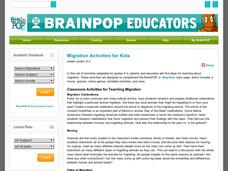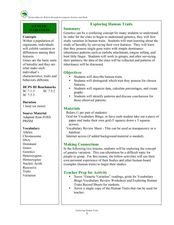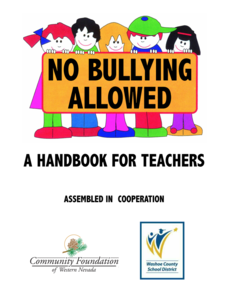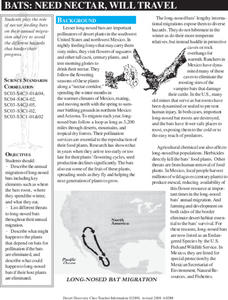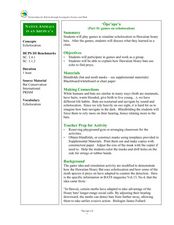American Psychological Association
Using Psychological Perspectives to Answer Questions on Behavior
Perspective is everything when it comes to assessing human behavior. Class members examine a series of statements and identify the perspective represented by each to demonstrate their understanding of different psychological perspectives.
Do2Learn
Social: Behavior
What does "good behavior" look like? Set clear guidelines for what type of behavior is expected in different situations, and ensure your learners understand the verbal cues that you provide.
Curated OER
Survival: The Human Body in Extreme Environments
Learners name and describe the major systems that work together as a unity to monitor and regulate the human body as it goes about its business of securing the essential requirements for life. They identify specific human features and/or...
Channel Islands Film
Natural Resources, and Human Uses of Plants and Animals
As part of their study of the restoration projects on Santa Cruz Island, class members demonstrate their understanding of the connections among plant life, animals, and the actions of humans by crafting a model that reveals these...
BrainPOP
Migration Activities for Kids
For as long as there has been life on earth, animals, including humans, have used migration as a means of survival. This collection of activities supports young scientists as they learn about this behavioral adaptation, encouraging them...
Curated OER
Trembling, Spewing Earth: Impacts on Human Activity
Seventh graders study to identify patterns in earthquake activity and impacts on human behavior. They also develop plans to cope with such natural disasters.
Curated OER
Why Do People Fall in Love?
Students discuss human behavior, sexual selection and the underlying genetic and evolutionary reasons for mate selection. The, in groups, they rate the attractiveness of certain individuals and measure facial features for symmetry.
College Board
AP® Psychology: Special Focus - The Brain, the Nervous System, and Behavior
How does the brain send signals to the rest of the body? Scholars research and analyze the functions of the brain and the central nervous system in the human body. Using hands-on activities, reflections, and research, they begin to...
Curated OER
Exploring Human Traits
Learners explore human behavior by participating in a class science game. In this human characteristics lesson, students identify different human traits that are passed down by each generation and the purpose each of them have. Learners...
Curated OER
Religion and Ethics: Living with Special Needs
Students explore human behavior by exploring mental and physical disabilities. In this learning disability lesson, students identify the different disabilities students have which prevent them from working at the same pace as the rest of...
Curated OER
Skin: The Behavior and Health Connection
Students explore how personal behavior can affect health, especially the health of your skin. They become better aware of how their personal behavior and the environment can have a considerable impact on their health in general. Students...
Community Foundation of Western Nevada
No Bullying Allowed
Through discussion, role play, read-alouds, writing, and more, scholars explore the concept of bullying and practice having courage while responsibly reporting unfriendly behavior. Friendship and respect are practiced and encouraged. ...
Curated OER
Sexual Exploitation: Consent vs. Exploitation
Students read about human behavior by completing a worksheet in class. For this sexual activity lesson, students identify the importance about consenting to sexual behavior as opposed to being forced into it or being exploited. Students...
Curated OER
Human Impacts on Major Rivers of the World
Middle schoolers explore motivations behind human intervention in the stream flow of selected rivers, infer kinds of interventions and their results, and evaluate level of success of such interventions of stream flow as well as...
Talking with Trees
What is Responsibility?
Encourage responsible behavior with a worksheet that challenges scholars to read four scenarios, identify the level of responsibility, and brainstorm consequences of the actions taken.
King Country
Lesson 2: Private & Public
What is the difference between a private and a public place? The focus in this second lesson on family life and sexual health is building an understanding of the difference between the concepts of private and public and the behaviors...
Health Smart Virginia
Social Emotional Skills Lessons Overview
Sometimes the hardest part of planning any unit of instruction is determining the activities that reinforce the concepts of the lessons and support the development of student skills. This first resource in the Health Smart series...
KOG Ranger Program
Fire Behavior in Forests
Understanding the ways a fire will act is a key factor in fire safety and fire prevention. Young campers focus on how the weather and terrain can affect the behavior of a fire with topographic maps and different scenarios.
Prince William Network
The Incredible Journey
Divide your school gym into breeding grounds and non-breeding grounds so that your zoologists can play a game simulating the seasonal migration of shorebirds. Players pick one of the included game cards and follow its directions, which...
Curated OER
Student Opinion: How Impulsive Are You?
Sure to spark lively discussion in any Language Arts classroom, this article from The York Times asks the question, 'How much self-control do you have?'. Pupils begin by reading a short passage about a study on delayed gratification and...
Federal Reserve Bank
Ben Franklin: Highlighting the Printer
By studying Benjamin Franklin's work as a printer, your class will have a fantastic opportunity to learn about the economic concepts of entrepreneurship, human capital, and investment.
National Park Service
News Bearly Fit to Print
There are an average of three human fatalities by bears in North America every year, which is low when you compare it to the 26 killed by dogs and the 90 killed by lightning annually. The lesson encourages researching human-bear...
Curated OER
Bats: Need Nectar, Will Travel
Beginning wildlife biologists become adult bats, baby bats, snakes, owls, bobcats, or land-clearing developers in a grand role-playing activity. In a large open space, they play a game in which they move to designated areas based on what...
Curated OER
Games on Echolocation
Get a little batty with life science! This fun simulation game replicates how bats use echolocation to hunt moths in their native Hawaiian habitat. After creating blind folds and discussing some basic principles of echolocation, students...






